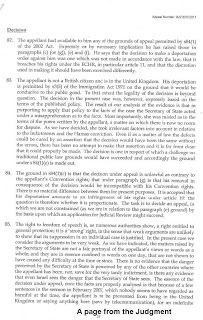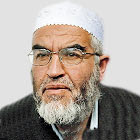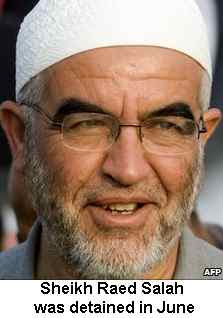It is with some pride that I found out that in the initial appeal against the proposed deportation of the leader of the Islamic Movement in Israel, Raed Salah, this blog was quoted as evidence of the dubious credentials of the Zionist Community Security Trust. This story came out as this blog was taking a rest but I’m happy to report this wonderful victory.
Theresa May, Britain’s appalling Home Secretary, may be a bigot, but she is an incompetent bigot, as the latest furore over Abu Qatada demonstrates. When the Jerusalem Post, today a right-wing Zionist rag (before the Zionist crook Conrad Black took over it was a liberal paper in Israeli terms) reprinted a piece by Raed Salah, deliberately inserting anti-Semitic comments that he hadn’t made, this was picked up by the CST, whose main purpose is to harass Jewish anti-Zionists and pay its senior staff 5 figure salaries. Theresa May in turn quoted the CST, a body with close contacts to both the British Police and Israeli secret state.
However the defence proved that quotes attributed to Raed Salah were not anti-Semitic and even if he had been guilty of the same, they bear no comparison to the rabid anti-Arab racism that the CST and its camp followers endorse. Anti-Arab racism is kosher in Zionist eyes, unlike any trace of ‘anti-Semitism’.
Tony Greenstein
I came to the UK to talk about the plight of the Palestinians but ended up fighting deportation. This is what I wanted to say
In June 2011 I came to Britain to begin a speaking tour to draw attention to the plight of my people, the Palestinian citizens of Israel. The tour was meant to last 10 days. Instead I had to stay for 10 months in order to resist an attempt by the home secretary, Theresa May, to deport me – itself the result of a smear campaign against me and what I represent. I fought not just for my own sake, but for all who are smeared because they support the Palestinian cause.
Since 1990 I have visited the UK several times to speak publicly. On this occasion I was arrested, imprisoned, and told I was to be deported to Israel because my presence in the UK was “not conducive to the public good”. A judge later ruled that I had been illegally detained, but bail conditions continued to severely restrict my freedom, making it impossible for me to speak as I had intended.
After a 10-month legal battle, I have now been cleared on “all grounds” by a senior immigration tribunal judge, who ruled that May’s decision to deport me was “entirely unnecessary” and that she had been “misled”. The evidence she relied on (which included a poem of mine which had been doctored to make it appear anti-Jewish) was not, he concluded, a fair portrayal of my views. In reality, I reject any and every form of racism, including antisemitism.
I have no doubt that, despite this, Israel’s cheerleaders in Britain will continue to smear my character. This is the price every Palestinian leader and campaigner is forced to pay.
My people – the Palestinians – are the longstanding victims of Israeli racism. Victims of racism, anywhere, should never condone or support the maltreatment of another people, as Israel does.
The suffering of the Palestinian citizens of Israel has been ignored for decades. But there is today a growing awareness of it, which partially explains this smear campaign against me. In December 2011, EU ambassadors in Israel raised serious concerns about Israeli discrimination, noting that “not only has the situation of the Palestinian Arab minority in Israel not improved, but it has further deteriorated”.
There are around 1.5 million Arabs in Israel. We make up 17% of the population, but we face a barrage of racist policies and discriminatory laws. We receive less than 5% of funds allocated by the government for development. Public spending on children in Arab municipalities is one-third lower than that of children in Jewish municipalities. The average hourly wage of Arab workers is about 70% of that of Jewish workers. Any Jew, from any country, is allowed under Israel’s law of return to migrate to Israel; Palestinian refugees are not allowed to exercise their right of return. While a Jew can live anywhere in Israel, a Palestinian citizen cannot. Jews can marry whoever they wish and live with them in Israel, Palestinian citizens cannot.
In the criminal justice system, a 2011 study commissioned by Israel’s courts administration and Israel bar association revealed that almost half of Arabs receive custodial sentences for certain crimes, compared to a third of Jews. While 63.5% of Arabs convicted of violent crimes were sentenced to prison, only 43.7% of similar Jewish offenders were.
Education is only one of several areas in which Palestinian citizens face discrimination in Israel. The Israeli government allocates less money per head for Arab children’s education than it does for that of Jewish children. One devastating consequence is that the drop-out rate from schools is three times higher among Arabs than among Jews.
Nowhere is the injustice more striking than in the Negev. Living in poverty in “unrecognised” villages, the Arab Bedouin are ineligible for basic services such as water, electricity, and healthcare. The Negev village of al-Araqib has been demolished 35 times by the Israeli government; on every occasion it was rebuilt by its inhabitants.
Despite the Israeli policy of “transfer” – another term for ethnic cleansing – the Palestinians will not go away. The Israeli state can occupy our lands, demolish our homes, drill tunnels under the old city of Jerusalem – but we will not disappear. Instead, we now aspire to a directly elected leadership for Palestinians in Israel; one that would truly represent our interests. We seek only the legal rights guaranteed to us by international conventions and laws.
The Palestinian issue can only be resolved if Israel and its supporters in Britain abandon the dogmas of supremacy and truly adhere to the universal values of justice and fairness. Britain has a special responsibility in this, because it is uniquely responsible for our suffering: our national tragedy began with the Balfour Declaration.
While Britain enforced the first part of the declaration, which promised Palestine as a homeland for the Jewish people, but ignored the part that states: “It being clearly understood that nothing shall be done which may prejudice the civil and religious rights of existing non-Jewish communities in Palestine.” If there is any lesson to be learned from this sordid affair, it is that there is nothing to gain from putting false words into my mouth, or casting me out of the mainstream of public discourse.
The news broke last night that Palestinian activist Sheikh Raed Salah had won his appeal against deportation from the UK in the Upper Tier (Immigration) Tribunal in London.
My full story will be published on EI soon, including new revelations about the case, and its implications for the government’s Prevent “anti-terrorism” strategy. Meanwhile, here is the judge’s decision (a scan of the full document is forthcoming, but this extract is essentially the bottom line).
It is an important ruling. You’ll note in paragraph 90 that the judge Mark Ockelton even says of the ban (“exclusion order”) which Home Secretary Theresa May secretly imposed on Salah that there is now “no lawful basis” for it to be implemented. This is important, as the appeal was against the deportation, not the banning order.
Three of the groups that organised Raed Salah’s UK tour have also issued press releases: MEMO, Friends of Al-Aqsa and the PSC.
Salah has been stuck in the UK since June 2011, when he was arrested, despite entering the country legally for a well-publicised speaking tour. He was released on conditional bail in July and has been fighting in the courts to clear his name since then.



